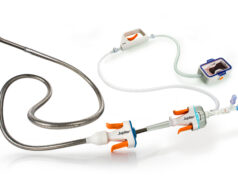
Silk Road Medical’s 30-day outcomes from the ROADSTER IDE study were presented at the Late Breaking Clinical Trials Session at the 2014 Vascular InterVentional Advances (VIVA) Meeting in Las Vegas, with additional data presented at the VEITHsymposium in New York.
The trial studied the Enroute transcarotid neuroprotection system (NPS), which is designed to provide direct access to the carotid artery and reduce the risk of stroke during carotid angioplasty and stenting (CAS) by diverting dangerous debris away from the brain with a surgically-inspired mechanism to temporarily reverse blood flow. The 1.4% 30-day stroke rate was the lowest seen to date of any contemporary prospective trial of CAS.
Celebrating its 60th anniversary in 2013, carotid endarterectomy (CEA) has been the gold standard in carotid artery revascularisation because of the low stroke and death rates in multiple prospective trials. Yet CEA is not free of the potential for certain local and systemic complications such as cranial nerve injury and myocardial infarction.
Fifteen years ago transfemoral CAS was introduced with much initial excitement due to the minimally invasive, endovascular advantage, but fell out of favour for physicians and payers due to the excess risk of periprocedural stroke compared to CEA. In a standard surgical risk population, the CREST trial demonstrated that periprocedural strokes occur twice as often in transfemoral CAS patients.
ROADSTER was a prospective, multicentre, IDE study designed to evaluate the safety and effectiveness of the Enroute transcarotid NPS in a hybrid procedure combining the best elements of CEA and CAS. Richard Cambria and Christopher Kwolek, of Massachusetts General Hospital, served as the trial national co-principal investigators. Patients were enrolled at 15 vascular surgery sites, one neurosurgery site, and two multi-specialty sites. The primary endpoint was a composite of any stroke (S), death (D), or myocardial infarction (MI) through 30 days.
Two-hundred and eight (67 lead-in, 141 pivotal) symptomatic and asymptomatic patients who were at high risk for complications from CEA were enrolled. Food and Drug Administration (FDA)-approved carotid stent systems were delivered through the direct carotid access point under high rate flow reversal afforded by the Enroute transcarotid NPS. Baseline pivotal population characteristics included 26% symptomatic, 35% female, and 47% age greater than or equal to 75.
|
ROADSTER trial results at 30 days |
ITT population n=141 |
Per protocol population n=136 |
|
Stroke/death/MI |
3.5% |
2.9% |
|
Stroke/death |
2.8% |
2.2% |
|
All stroke |
1.4% |
0.7% |
There were no strokes in patient’s age greater than or equal to 75 or in symptomatic patients. There was one (0.7%) CNI presenting as hoarseness which fully resolved.
“These stroke rates in a high surgical risk population are the lowest to date for CAS and comparable to the periprocedural rates in the standard surgical risk CEA arm of CREST (2.3%). The Silk Road procedure is less of an operation for the patient than a traditional CEA and can be performed in under an hour with local anaesthesia,” Cambria explains.
Erica Rogers, chief executive officer of Silk Road Medical, says: “The ROADSTER data support our hypotheses that led to this device design and procedure. It is all about stroke. Doctors perform these procedures to reduce the risk of stroke, not to cause a stroke. The ENROUTE transcarotid platform finally delivers a less invasive alternative with the neuroprotection you would expect from a CEA procedure.”
The Enroute NPS and Stent Systems are limited by United States law to investigational use; the Enroute transcarotid NPS has been submitted for 510(k) review and the ROADSTER trial also supports the pending Premarket Approval PMA for the Enroute transcarotid Stent System. The Enroute transcarotid NPS and the Enroute transcarotid Stent System have been granted CE mark.










